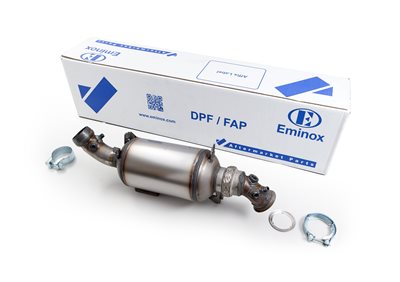Neil Koston, Aftermarket Product Manager at Eminox, looks at why the company has introduced a range of direct fit replacement Diesel Particulate Filters (DPFs) for light commercial vehicles (LCVs).
Having worked in workshops, motor factors and at parts manufacturers, Neil understands that a balance of price and quality is required at each level of the supply chain.
“Ever more stringent EU legislation means that all commercial vehicles are now fitted with diesel particulate filters in the exhaust system. DPFs reduce particulate matter in diesel engine exhausts by trapping particles. The latest DPFs are highly effective at cutting emissions, trapping even the smallest soot particles produced as the engine burns diesel fuel.
A DPF is a serviceable, replacement item like oil and air filters. Correct maintenance and replacement is required throughout the life of the vehicle. The replacement period of a DPF is dependent on various factors; the materials used to make it, fuel quality, driving style, oil consumption and the how the vehicle is maintained.
Against this background and the Eminox commitment to tackle air pollution from diesel vehicles, we have developed a range of replacement diesel particulate wall flow filters which are new replacement parts for the OEM filters.
Many aftermarket DPFs are manufactured using a cordierite substrate. With the experience Eminox have with DPFs – being a pioneer of the technology in 1995 – we realise that, without knowing the specific use of the vehicle, it is important to use silicon carbide rather than cordierite. Silicon carbide offers higher maximum operating temperatures, low thermal expansion and resistance to thermal stress.

